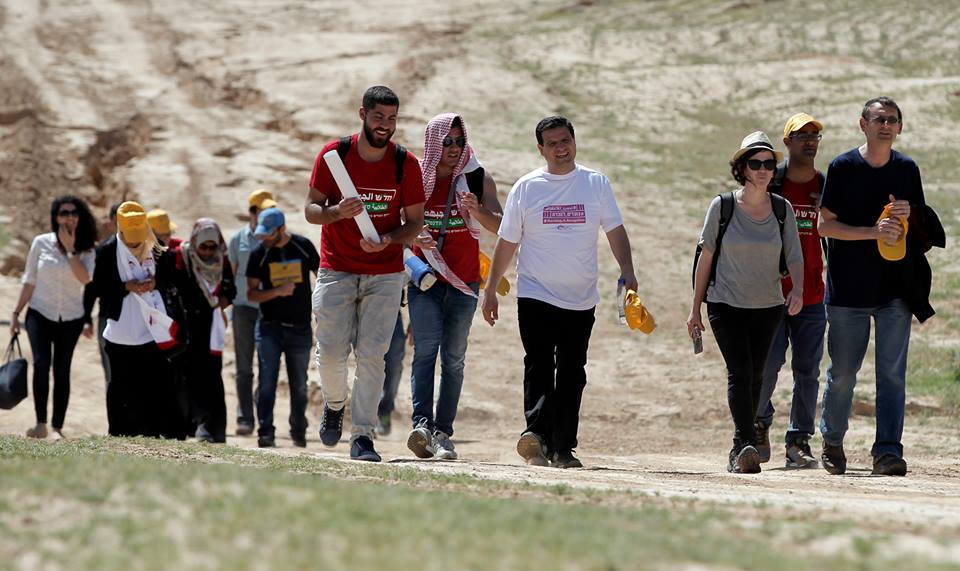Ayman Odeh: “We reject the equation that it is all Jews against all Arabs”
By Khaled Diab
As the Israeli Knesset declares war on its Palestinian members, Ayman Odeh believes the only way forward is through a joint Arab-Jewish struggle.

Thursday 4 August 2016
In a move billed as defending democracy but actually undermines and compromises it, Israel's Knesset has passed a law that enables parliamentarians to gang up on a member and expel him or her, effectively ignoring the will of the electorate.
Critics have described the new legislation as threatening the “very building blocks of democracy” and encouraging the “tyranny of the majority”.
The new legislation allows Knesset members to act as judge, jury and executioner in cases where they perceive that a fellow parliamentarian has incited to violence or racism, supported armed conflict against Israel, or rejected Israel as a Jewish and democratic state.
Although many on the ultranationalist and religious right express racist views and incite against Palestinians, the wording and timing of the new law is seen by politicians across the spectrum and human rights groups as expressly targeting Arab Knesset members – not to mention Jewish leftists.
“The Expulsion Law is the latest expression in a disturbing national tendency over the past several years,” said Adalah, a legal centre representing Israel's Arab minority, “intended, via varying means, to silence the Arab public.”
Ayman Odeh, the popular and widely respected head of the coalition of Arab-dominated parties in the Knesset known as the Joint List, did not mince his words. “Netanyahu doesn't want Arabs to vote; he doesn't want us to be a legitimate political force,” Odeh was quoted in the Israeli media as saying. “That's why he systematically incites against the Arab public and against its elected officials.”
Not long before the vote, I visited Ayman Odeh in his office at the Knesset. Even after years of interaction with Israel, wandering through the corridors of Israeli political power felt almost unreal.
When he greeted me, the charismatic leader who, in 2015, led the Joint List to the most significant victory ever scored by an Arab party, looked weary and troubled. Asking me to excuse his state, he explained that he'd been working very long hours on a number of important files.
One of the issues preying on his mind must have been the ongoing concerted effort by the far-right ruling coalition to find a mechanism for removing the “rabble-rousers” among the Arab representatives, especially the Palestinian nationalist Balad party's Haneen Zoabi.
“Our presence here [in the Knesset] is a daily challenge to the racists who want a Jewish-only state,” Odeh told me. “Our enemies want us to isolate ourselves and not to participate. This is what Netanyahu wants. He wants a pure Jewish state.”
The entire idea behind the Joint List – which is an unlikely alliance of secularist, Arab-Jewish leftist, Palestinian nationalist and Islamist parties – was to challenge previous attempts to isolate and marginalise Palestinian-Israeli voters and their representatives, including the controversial law raising the threshold for Knesset entry.
And the Joint List was spectacularly successful in this regard. By joining forces, the Arab parties managed to become the third largest bloc in the Knesset, even though Binyamin Netanyahu maintained his velcro grip on power and cobbled together an ultranationalist ruling coalition.
“During the elections, we achieved three unprecedented accomplishments: 88% of our people voted for us, we became the third power, with 13 seats,” Odeh recalls. “All these matters are unprecedented, since 1948 to this day.”
And with the Israeli left weakened and in disarray, the Joint List has found itself not only playing the role as the main line of defence against the rightwing campaign to further sideline Palestinians in Israel and salvage the prospects for peace, it is also acting as one of the last bastions defending Israeli democracy against an authoritarian rightist takeover.
Although Odeh is a veteran of local politics in his hometown, Haifa, he has been dropped in at the deep end during his first term at the Knesset. But his charisma, political adeptness and fresh, inclusive discourse has meant that this baptism of fire is actually redefining Israeli politics and helping to rewrite the rulebook of Israel-Palestinian engagement.
Long a member of the leftist Jewish-Arab Hadash party, which he now heads, Odeh is committed to co-operation with sympathetic Israeli Jews and in engaging with Israeli mainstream society. “We reject the equation that it is all Jews against all Arabs, or all Arabs against all Jews,” he emphasised. “This is a joint struggle between Arab and Jewish democrats against racist policies.”
This has worked to the Joint List's advantage and Odeh has become something of a sensation among progressive and liberal Israelis. “We have opened up new horizons and extended bridges to segments of Jewish society, to challenge Netanyahu's government,” he said.
“I can say confidently that the Jewish public has debated the status of Arab citizens this past year more than at any time since 1948,” Odeh insists.
Although Odeh's idea for a 10-year programme to develop Arab areas of Israel forced the government to unveil a five-year, $3.9-billion development plan for these underprivileged areas, other concrete successes are few and far between.
The onward march of the far-right seems, for the time being, unstoppable, and the peace process is in tatters. But in the longer term, Odeh believes optimistically that equality and peace are both achievable.
“Nobody is saying that our struggle is easy or that life is easy,” Odeh admits openly. “This struggle, which proposes a democratic alternative and is made up of both Arabs and Jews, will ultimately be the victorious one.”
____
Follow Khaled Diab on Twitter.
This article first appeared in The National on 31 July 2016.


